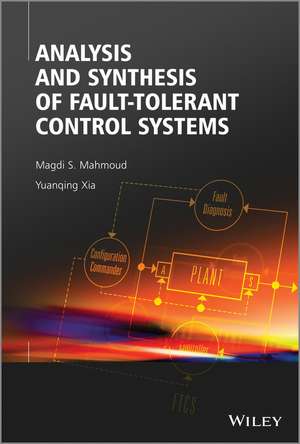Analysis and Synthesis of Fault–Tolerant Control Systems
Autor MS Mahmouden Limba Engleză Hardback – 26 dec 2013
Preț: 634.52 lei
Preț vechi: 918.82 lei
-31% Nou
Puncte Express: 952
Preț estimativ în valută:
121.47€ • 124.93$ • 100.77£
121.47€ • 124.93$ • 100.77£
Carte indisponibilă temporar
Doresc să fiu notificat când acest titlu va fi disponibil:
Se trimite...
Preluare comenzi: 021 569.72.76
Specificații
ISBN-13: 9781118541333
ISBN-10: 1118541332
Pagini: 480
Dimensiuni: 176 x 254 x 28 mm
Greutate: 0.86 kg
Ediția:New.
Editura: Wiley
Locul publicării:Chichester, United Kingdom
ISBN-10: 1118541332
Pagini: 480
Dimensiuni: 176 x 254 x 28 mm
Greutate: 0.86 kg
Ediția:New.
Editura: Wiley
Locul publicării:Chichester, United Kingdom
Public țintă
Primary: Researchers and practitioners in mechanical, aerospace, electrical and industrial engineering.Secondary: Graduates and senior undergraduates in control; process; electrical; mechanical; aerospace; chemical; and mechatronics engineering departments.
Cuprins
Notă biografică
MagdiSadek Mahmoud obtained Ph. D. in systems engineering from Cairo University, 1974. He has been a professor of engineering since 1984. He is now a Distinguished University Professor at KFUPM, Saudi Arabia. He worked at different universities world-wide including Egypt, Kuwait, UAE, UK, USA, Singapore and Australia.He lectured in Venezuela, Germany, UK, USA, Canada and China. He has been actively engaged in teaching and research in the development of modern methodologies to distributed control and filtering, switched time-delay systems, fault-tolerant systems and information technology. He is the principal author of thirty (30) books, inclusive book-chapters and the author/co-author of more than 500 peer-reviewed papers. He is the recipient of two national, one regional and four university prizes for outstanding research in engineering. He is a fellow of the IEE, a senior member of the IEEE, the CEI (UK), and a registered consultant engineer of information engineering and systems (Egypt). Email: magdim@yahoo.com, msmahmoud@kfupm.edu.sa, Website: http://faculty.kfupm.edu.sa/se/msmahmoud/ Dr. Yuanqing Xia received his M.S. degree in Fundamental Mathematics from Anhui University, China, in 1998 and his Ph.D. Degree in Control Theory and Control Engineering from Beijing University of Aeronautics and Astronautics, Beijing, China, in 2001. From 1991-1995, he was with Tongcheng Middle-School, Anhui, China, where he worked as a teacher. During January 2002-November 2003, he was a postdoctoral research associate in the Institute of Systems Science, Academy of Mathematics and System Sciences, Chinese Academy of Sciences, Beijing, China, where he worked on navigation, guidance and control. From November 2003 to February 2004, he was with the National University of Singapore as a research fellow, where he worked on variable structure control. From February 2004 to February 2006, he was with the University of Glamorgan, Pontypridd, U.K., as a Research Fellow, where he worked on networked control systems. From February 2007 to June 2008, he was a Guest Professor with Innsbruck Medical University, Innsbruck, Austria, where he worked on biomedical signal processing. Since July 2004, he has been with the Department of Automatic Control, Beijing Institute of Technology, Beijing, first as an Associate Professor, then, since 2008, as a Professor and in 2012. He has published five monographs in Springer and more than 100 papers in journals. He was appointed as ``Xu Teli" distinguished professor in Beijing Institute of Technology and obtained National Science Foundation for Distinguished Young Scholars of China. He was obtained Second Award of Beijing Municipal Science and Technology (No.1) in 2010 , Second National Award for Science and Technology (No.2) in 2011, and second natural science award of The Ministry of Education in 2012. He is an editor in deputy of Journal of Beijing Institute of Technology, associate editor of Acta Automatica Sinica, International Journal of Innovative Computing, Information and Control.
Descriere
In recent years, control systems have become more sophisticated in order to meet increased performance and safety requirements for modern technological systems.
